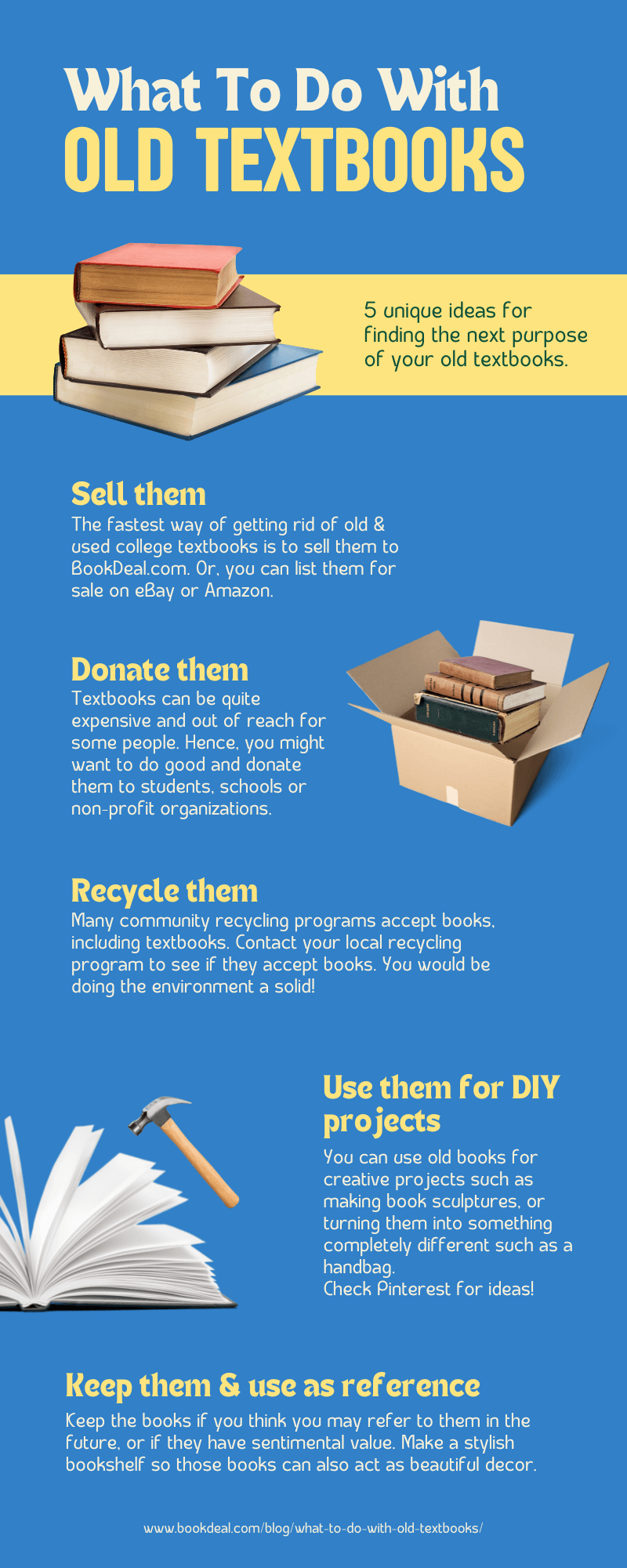Old textbooks can pile up quickly, taking up valuable space in your home and collecting dust on your shelves.
But, rather than letting them go to waste, there are plenty of options for what to do with old textbooks:
Sell them: You can sell your old books to other students, online marketplaces, or bookstore buyback programs.
Donate them: You can donate your old textbooks to schools, libraries, or non-profit organizations in need.
Recycle them: Many community recycling programs accept books, including textbooks. Contact your local recycling program to see if they accept books, and if they have specific guidelines for their disposal.
Use them for DIY projects: You can use old books for creative projects such as making book sculptures or using them as a base for a homemade journal or notebook.
Keep them: Keep the books if you think you may refer to them in the future, or if they have sentimental value.
Find out more about these options below!

#1 Sell textbooks
Selling textbooks is a great way to make some extra money and get rid of books you no longer need. Here are some options for selling textbooks in the United States:
1) BookDeal.com – BookDeal is a go-to platform for many college students to quickly sell their used college textbooks for cash! You can get instant quotes and easily compare the buyback prices of your books on BookDeal.
2) Online marketplaces: Online marketplaces such as Amazon, Ebay, and Bookscouter allow you to sell your textbooks directly to buyers. You can list your books for sale and set your own prices.
3) College buyback programs: Many college bookstores offer buyback programs for textbooks, often at the end of each semester. You can check with your college bookstore to see if they have a buyback program.
4) Independent bookstores: Some independent bookstores have a buyback program. You can contact them and ask if they buy used textbooks.
When selling your textbooks, it’s important to research the current market value of the books you plan to sell, and compare prices from different sources. It’s also a good idea to check the condition of your books and make sure they are in good shape before listing them for sale.
It’s worth noting that selling your textbooks can help you recoup some of the cost of your education and it can be a good way to make some extra cash. Additionally, it will help to reduce the need for new books and also reduces the environmental impact of producing new books.
Pro tip: You can also get the quotes from our partner Sell Textbooks Online. They launched in 2023 and have many buyback options for used books and textbooks.
#2 Donate textbooks
Donating textbooks is a great way to give back to your community and ensure that they are put to good use. There are several organizations and institutions in the United States that accept textbook donations. Here are some options to consider:
1) Schools and libraries: Many schools and libraries in low-income communities may not have access to the same resources as wealthier schools. Contact your local schools and libraries to see if they accept textbook donations.
2) Non-profit organizations: There are many non-profit organizations that collect and distribute textbooks to underprivileged students. Some examples include Books for Africa, and Textbooks for Change.
3) Bookstores: Some independent bookstores or bookstore chains have a buyback program or a book donation program. They may give you a credit or cash for your books.
4) Online marketplaces: Online marketplaces such as Amazon and Ebay allows you to sell your books directly to buyers.
5) Local charities: Local charities such as Salvation Army, Goodwill and others often have a donation center where you can drop off your books.
When you are ready to donate your textbooks, be sure to check the condition of the books, and if possible, sort them by subject and grade level. It is also important to check with the organization for their specific guidelines and requirements before making a donation.
It’s worth noting that some states may allow tax deductions for charitable donations, including book donations. It is advisable to check with your local tax authorities for more information.
By donating your old textbooks, you can help support education and literacy, and make a positive impact on the community.
#3 Recycle textbooks
Recycling textbooks is an environmentally friendly way to dispose of them, and there are several options for recycling textbooks in the United States.
1) Local recycling programs: Many cities and towns have curbside recycling programs that accept paper products, including books. Check with your local recycling program to see if they accept books and if they have specific guidelines for their disposal.
2) Paper mills: Some paper mills accept books for recycling and may even pay for them. Contact your local mills to see if they accept books and what their requirements are.
3) Bookstores: Some independent bookstores or bookstore chains have a buyback program or a book recycling program. They may give you a credit or cash for your books.
4) Earth911: This website allows you to search for recycling locations by zip code and material type. You can find locations that accept books for recycling and get more information about the process.
It is worth noting that recycling of books helps to conserve natural resources, reduces pollution and reduces the need for landfills. It also helps to reduce the demand for virgin materials and saves energy.
#4 Use them for DIY projects
If you’re still wondering what to do with old textbooks, there are countless ways to use old textbooks for DIY projects and most of them land on Pinterest. Some people create picture frames out of old textbooks, while others create a bag, or a secret storage compartment.
To find do-it-yourself book craft ideas on Pinterest, start by searching for keywords related to book crafts, such as “bookbinding,” “book art,” or “upcycled books.” You can also browse through the “DIY & Crafts” or “Home Decor” categories to find related ideas.
Look at the images and read the descriptions to find inspiration for your own book craft projects. Additionally, you can save the pins you like to your own boards for future reference, and follow other users who post book craft ideas to keep updated on new projects.
#5 Just keep them
If you think your textbooks might appreciate in value over time, or you might refer back to them in the future, you might as well keep some of them.
Not only you would be storing knowledge on your walls, but having books on your shelves is always a good look – from decoration perspective.
Here’s a few tips for storing your textbooks on the shelves:
Organize your textbooks by subject or course. This will make it easier to find the book you need and will also help keep your books in better condition, as they will not be moved around as much.
Keep books upright on the shelves. Storing books lying flat can cause the spine to become damaged over time.
Use bookmarks or post-it notes instead of dog-earing pages. Dog-earing pages can cause the pages to become damaged over time.
Keep textbooks in a clean and dry place, away from direct sunlight and heat sources. Avoid storing them in damp or humid areas, as this can cause the pages to warp or become moldy.
What to do with old textbooks: Conclusion
Old textbooks can be repurposed in a variety of ways. One option is to donate them to schools or libraries in need. Another option is to sell them online or at a used bookstore. Another way is to recycle them, if they are no longer useful. If the text books are still useful, but you no longer need them, consider passing them on to someone who can use them, such as a student, a friend, or a family member.
Contributors:


Author: Ernest Atta Adjei
Ernest is a writer for BookDeal and is passionate about writing articles related to books, personal finance, students, as well as lifestyle. With more than 8 years of experience and nearly 500+ articles published on the internet, Ernest’s articles have helped thousands of people!
LinkedIn

[…] wait for years after college before you sell your old textbooks. Usually, buyback sites buy books up to a few years after the original purchase. But it depends if […]